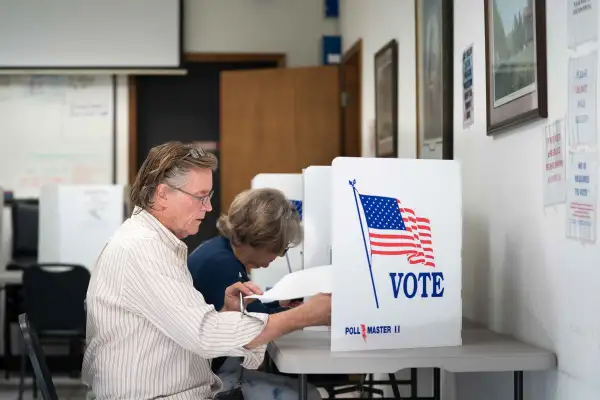Does Your Job Have to Give You Time Off Work to Vote in the Midterm Elections?

There's a good chance you can vote on Tuesday while you're still on the clock for work.
Most U.S. states require that employers give workers time off to vote in federal elections, including the midterm elections on Tuesday, Nov. 8.
But there’s no federal requirement that ensures workers get time off to vote, so the rules vary significantly depending on where you live.
Laws that guarantee time off for voting are meant to make it so more Americans can get out to the polls. In the last midterm elections in 2018, 53.4% of voting-age citizens turned out to vote, according to Census data. (Voter participation rates are generally much lower for midterm elections than presidential elections.)
In states with mandates that employers give paid time off, it’s typical for the laws to provide that full-time workers get two or three hours off from work on election day to go vote.
According to a report from the Society for Human Resource Management, a total of 30 states require time off for voting. A handful of those states only require that employers give unpaid time off.
State laws requiring paid time off work for voting
Laws on time off for voting vary around the country. Some state laws say workers must give their employers notice in advance that they intend to take advantage of paid time off for voting. Other states, like Missouri and Hawaii, allow employers to ask for proof that an employee who takes time off actually votes.
Part-time workers may not be able to access paid time to vote. In most of the states that have paid-time-off laws, the perk may be available only to workers who don't have an extended period of time before or after their shift when they could vote.
There are other peculiarities to some state rules. In Ohio, only salaried employees are entitled to paid time off to vote — so workers paid by the hour may not qualify. In New York and Minnesota, there's no set amount of time for voting. Eligible employees have the right to as much paid time off as they need to complete the voting process.
Nevada uses a mileage calculation of the distance between a voter's workplace and their polling place to determine how much time off must be provided. The law stipulates that if it’s impractical for an employee to vote before or after work, they’re entitled to an hour of paid time if their employer is less than two miles from the polls and up to three hours if it’s a longer trip.
How to find out if you get paid time off to vote
If you’re not sure if you get time off to vote, you could simply ask your supervisor or check if there are any details in your job contract or employee handbook. Workers who are represented by unions might be able to find out in their bargaining contract if they get paid time off to vote.
Many companies are encouraging electoral participation beyond what state laws require by providing paid time off in some cases or by encouraging a meeting-free weekday for election day.
More than 2,000 companies have pledged to allow employees time to vote. Their commitment is through the Time to Vote initiative, which has a website that lists all of the participating companies, including major employers like Visa, Target, Coca-Cola, Wells Fargo and JPMorgan Chase.
More from Money:
Stocks Usually Rise After Midterm Elections. Will That Happen This Time?
How the Midterm Elections Could Affect Inflation, Taxes and the Economy

